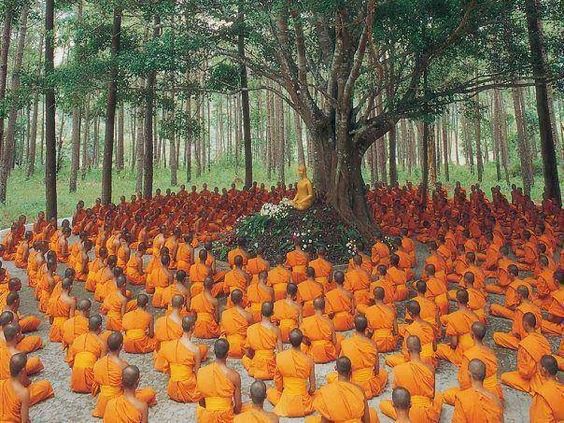1. Not a secret Doctrine
“These three things, monks, are conducted in secret, not
openly. What three? Affairs with women, the mantras of the brahmins, and wrong
view.
“But these three
things, monks, shine openly, not in secret. What three? The moon, the sun, and
the Dhamma and Discipline proclaimed by the Tathāgata.”
2. No Dogmas or Blind Belief
Thus have I heard. On one occasion the Blessed One was
wandering on tour together with a large Saṅgha of monks when he arrived at a
town of the Kālāmas named Kesaputta.2 Now the Kālāmas of Kesaputta heard: “It
is said that the ascetic Gotama, the Sakyan son who went forth from a Sakyan
family, has arrived at Kesaputta. Now a good report about that master Gotama
has been circulating thus: ‘That Blessed One is an arahant, perfectly
enlightened, accomplished in true knowledge and conduct, fortunate, knower of
the world, unsurpassed leader of persons to be tamed, teacher of devas and
humans, the Enlightened One, the Blessed One. Having realized with his own
direct knowledge this world with its devas, Māra, and Brahmā, this population
with its ascetics and brahmins, with its devas and humans, he makes it known to
others. He teaches a Dhamma that is good in the beginning, good in the middle,
and good in the end, with the right meaning and expression; he reveals a
spiritual life that is perfectly complete and purified.’ Now it is good to see
such arahants.”
Then the Kālāmas of Kesaputta approached the Blessed One.
Some paid homage to him and sat down to one side; some exchanged greetings with
him and, after their greetings and cordial talk, sat down to one side; some
saluted him reverentially and sat down to one side; some remained silent and
sat down to one side. Then the Kālāmas said to the Blessed One:
“Venerable sir, some ascetics and brahmins who come to
Kesaputta explain and elucidate their own doctrines, but disparage, debunk,
revile, and vilify the doctrines of others. But then some other ascetics and
brahmins come to Kesaputta, and they too explain and elucidate their own
doctrines, but disparage, debunk, revile, and vilify the doctrines of the
others. For us, venerable sir, there is perplexity and doubt as to which of
these good ascetics speak truth and which speak falsehood.”

“It is fitting for
you to be perplexed, O Kālāmas, it is fitting for you to be in doubt. Doubt has
arisen in you about a perplexing matter. Come, Kālāmas. Do not go by oral
tradition, by lineage of teaching, by hearsay, by a collection of texts, by
logic, by inferential reasoning, by reasoned cogitation, by the acceptance of a
view after pondering it, by the seeming competence of a speaker, or because you think,
‘The ascetic is our teacher.’4 But when you know for yourselves, ‘These things
are unwholesome; these things are blamable; these things are censured by the
wise; these things, if undertaken and practiced, lead to harm and suffering,’
then you should abandon them.
“What do you think,
Kālāmas? When greed, hatred, and delusion arise in a person, is it for his
welfare or harm?”
“For his harm, venerable sir.”
“Kālāmas, a person who is
greedy, hating, and deluded, overpowered by greed, hatred, and delusion, his
thoughts controlled by them, will destroy life, take what is not given, engage
in sexual misconduct, and tell lies; he will also prompt others to do likewise.
Will that conduce to his harm and suffering for a long time?”
“Yes, venerable
sir.”
“What do you think,
Kālāmas? Are these things wholesome or unwholesome?
”Unwholesome, venerable
sir.”
“Blamable or blameless?”
“Blamable, venerable sir.”
“Censured or praised
by the wise?”
“Censured, venerable sir.”
“Undertaken and practiced, do they
lead to harm and suffering or not, or how is it in this case?”
“Undertaken and
practiced, these things lead to harm and suffering. So it appears to us in this
case.”
“It was for this
reason, Kālāmas, that we said: Do not go by oral tradition.…
“Come, Kālāmas. Do
not go by oral tradition, by lineage of teaching, by hearsay, by a collection
of texts, by logic, by inferential reasoning, by reasoned cogitation, by the
acceptance of a view after pondering it, by the seeming competence of a
speaker, or because you think, ‘The ascetic is our teacher.’ But when you know
for yourselves, ‘These things are wholesome; these things are blameless; these
things are praised by the wise; these things, if undertaken and practiced, lead
to welfare and happiness,’ then you should engage in them.
“What do you think,
Kālāmas? When nongreed, nonhatred, and nondelusion arise in a person, is it for
his welfare or harm?”
“For his welfare, venerable sir.”
“Kālāmas, a person who
is without greed, without hatred, without delusion, not overpowered by greed,
hatred, and delusion, his thoughts not controlled by them, will abstain from
the destruction of life, from taking what is not given, from sexual misconduct,
and from false speech; he will also prompt others to do likewise. Will that
conduce to his welfare and happiness for a long time?”
“Yes, venerable sir.”
“What do you think,
Kālāmas? Are these things wholesome or unwholesome?
”Wholesome, venerable
sir.”
“Blamable or blameless?”
“Blameless, venerable sir.”
“Censured or praised
by the wise?”
“Praised,
venerable sir.”
“Undertaken and practiced, do they lead to
welfare and happiness or not, or how is it in this case?”
“Undertaken and
practiced, these things lead to welfare and happiness. So it appears to us in
this case.”
“It was for this reason, Kālāmas, that we said: Do not go
upon oral tradition….
“Then, Kālāmas, that noble disciple
devoid of covetousness,
devoid of ill will, unconfused, clearly comprehending, ever mindful dwells
pervading one quarter with a mind imbued with loving-kindness, likewise the
second quarter, the third, and the fourth. Thus above, below, across, and
everywhere, and to all as to himself, he dwells pervading the entire world with
a mind imbued with loving-kindness, vast, exalted, measureless, without
hostility and without ill will.

“He dwells pervading one quarter with a mind imbued with
compassion … with altruistic joy … with equanimity, likewise the second
quarter, the third, and the fourth. Thus above, below, across, and everywhere,
and to all as to himself, he dwells pervading the entire world with a mind
imbued with equanimity, vast, exalted, measureless, without hostility and
without ill will.
“When, Kālāmas, this
noble disciple has thus made his mind free of enmity, free of ill will,
uncorrupted and pure, he has won four assurances in this very life. “The first assurance he has won is this: ‘If
there is another world, and if good and bad deeds bear fruit and yield results,
it is possible that with the breakup of the body, after death, I shall arise in
a good destination, in a heavenly world.’
“The second assurance
he has won is this: ‘If there is no other world, and if good and bad deeds do
not bear fruit and yield results, still right here, in this very life, I live
happily, free of enmity and ill will.
“The third assurance
he has won is this: ‘Suppose evil befalls the evil-doer. Then, as I do not
intend evil for anyone, how can suffering afflict me, one who does no evil
deed?’
“The fourth assurance
he has won is this: ‘Suppose evil does not befall the evil-doer. Then right
here I see myself purified in both respects.’7
“When, Kālāmas, this
noble disciple has thus made his mind free of enmity, free of ill will,
uncorrupted, and pure, he has won these four assurances in this very life.”
“So it is, Blessed
One! So it is, Fortunate One! When this noble disciple has thus made his mind
free of enmity, free of ill will, uncorrupted and pure, he has won these four
assurances in this very life.
“Magnificent,
venerable sir! Magnificent, venerable sir!
The Blessed One has made the Dhamma clear in many ways, as
though he were turning upright what had been overthrown, revealing what was
hidden, showing the way to one who was lost, or holding up a lamp in the
darkness so those with good eyesight can see forms. We now go for refuge to the
Blessed One, to the Dhamma, and to the Saṅgha of monks. Let the Blessed One
accept us as lay followers who have gone for refuge from today until life’s
end.”